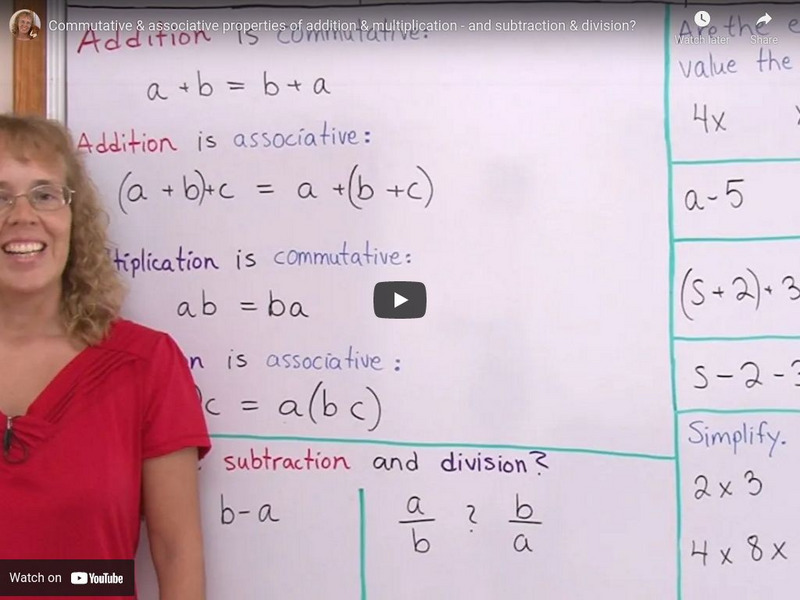Hi, what do you want to do?
Khan Academy
Representing a Number as a Decimal, Percent, and Fraction 2, Decimals, Pre-Algebra
There are two Khan Academy videos on representing numbers as decimals, percents, and fractions. This one shows students how to represent a fraction as a decimal and a percent. Sal demonstrates the process used to convert the fraction 7/8...
Corbett Maths
Multiplying Negative Numbers
Learning to multiply is the product of hard work. Viewers of a short instructional video review how to multiply negative numbers. They first use patterns to justify the rules for multiplication, then watch the narrator work through some...
PBS
Real-Life Math | Chef
Cook up a lesson on unit conversions. Scholars brainstorm how chefs use math in restaurants, and then watch a video of a real chef explaining how unit conversions, food and supply costs, portion sizes, and payroll all require math. They...
PBS
Real-Life Math | Woodworker
Woodworking is math-intensive work. Viewing a video of a woodworker explaining how he applies math in his craft sets the stage for a crafty lesson. Pupils use ratios and proportions to create scale drawings of objects.
Mathispower4u
Using the Distributive Property to Multiply Quickly
Can the distributive property help solve complex multiplication when you can't find a calculator? Yes, as a matter of fact, it can! Using addition, subtraction, and area models, the speaker explains how to simplify these problems and...
Mathispower4u
The Distributive Property with Negative Integers
Just over one third of all adults struggle when performing math operations with negative numbers. Addressing these skills early and often prevents these challenges later in life. Through multiple examples, worked step by step, viewers...
Mathispower4u
Introduction to the Distributive Property
Who needs parentheses, anyway? Understanding how to apply the distributive property—and how to get rid of parentheses—helps scholars conceptually understand why it is necessary. Guided practice problems help build confidence to create...
Krista King Math
Signed Numbers, Division
Teach dividing with both positive and negative integers by utilizing the video lesson. The instructor gives tricks for recognizing when the quotient will be positive and negative. She works out several examples of different combinations...
Krista King Math
Identity Numbers
Your identity doesn't change when you change clothes! The identity property is very similar. The video explains the identity number for addition and why it is known as that. Then the narrator describes the identity number for...
Scholastic
Study Jams! Decimal & Fraction Equivalents
If a candy bar costs 3/4 of a dollar, can your mathematicians figure out the cost in cents? After watching this animated video, your learners will see that every fraction can be a decimal and every decimal can be a fraction. The video...
Math Playground
Convert Fractions/Decimals to Percents
In this easy-to-understand video, an instructor shows how to convert fractions to decimals, decimals to percentages, and fractions to percentages. After watching this film, the conversion process should be easier for your learners to grasp.
Math TV
Math tv.com: Properties of Numbers: Associative Property
A math teacher and several students show you how to simplify expressions using the associative property. Several video demonstrations offer clear, step-by-step solutions to eight problems.
Math TV
Math tv.com: Properties of Numbers: Distributive Property
Learn how to apply the distributive property in order to solve simple algebraic expressions. Video demonstrations featuring a veteran teacher and several students offer step-by-step solutions to eleven problems.
Khan Academy
Khan Academy: Arithmetic and Pre Algebra: Distributive Property Example 1
This video provides several examples of using the distributive properties of multiplication and division to rewrite expressions. Practice problems are available. [5:39]
Khan Academy
Khan Academy: Arithmetic and Pre Algebra: Associative Law of Multiplication
This video shows the associative law of multiplication by grouping numbers in different ways. Practice problems are available. [2:15]
Khan Academy
Khan Academy: Arithmetic and Pre Algebra: The Distributive Property 2
This video shows the distributive property of multiplication over subtraction. Practice problems are available. [2:11]
Khan Academy
Khan Academy: Arithmetic and Pre Algebra: The Distributive Property
This video shows how to rewrite an expression using the distributive law of multiplication. Practice problems are available. [4:56]
Math TV
Math tv.com: Basic Mathematics: Mixed Numbers: Multiplication and Division
Students offer step-by-step solutions to math problems involving the multiplication and division of mixed numbers. In the left hand menu, click on Basic Mathematics, Mixed Numbers, Multiplication and Division.
Math Mammoth
Math Mammoth: The Distributive Property: Many Examples and the Area Model
This video presents examples of the distributive property with multiplication and addition, and its application in problems involving the area of rectangles. [12:12]
Math Mammoth
Math Mammoth: Commutative and Associative Properties
Explains what the commutative and associative properties of addition and multiplication are and investigates whether they work for subtraction and division. The video then looks at examples to see if expressions are equal and simplifies...
Khan Academy
Khan Academy: Expressions With Rational Numbers
Demonstrates how to compute with positive and negative fractions and compare the answers. [5:59]
Virtual Nerd
Virtual Nerd: What Is the Commutative Property of Multiplication?
The commutative property is very useful when multiplying numbers. This tutorial explains how to use it. [4:22]
Virtual Nerd
Virtual Nerd: What Is the Distributive Property?
The distributive property is important to understand for simplifying expressions. Watch this tutorial to learn more about it. [5:45]
Virtual Nerd
Virtual Nerd: What Are the Associative Properties of Addition and Multiplication
Take a look at this instructional video to learn about one of the most fundamental properties of math, the associative property. [5:13]




























